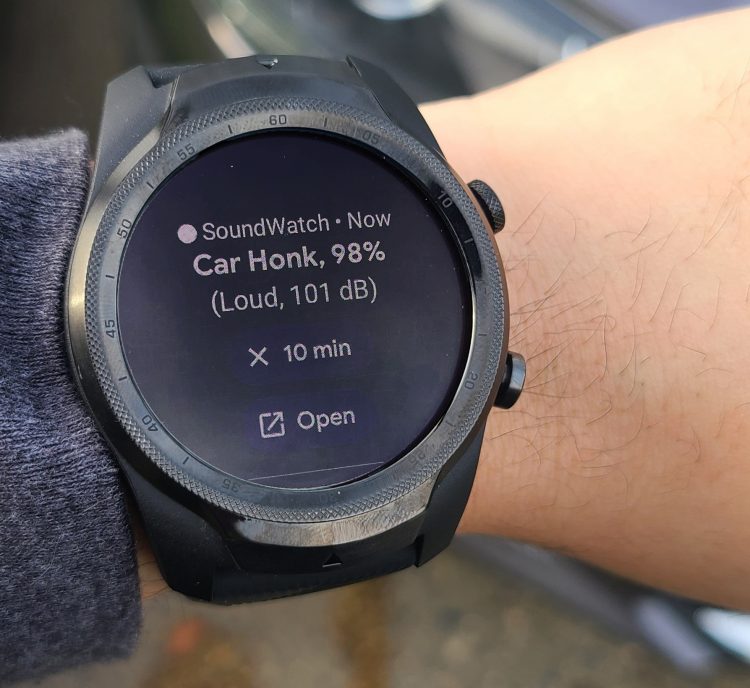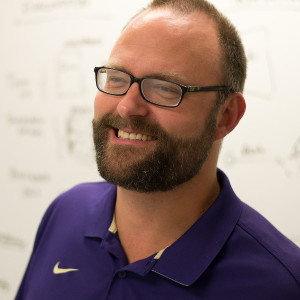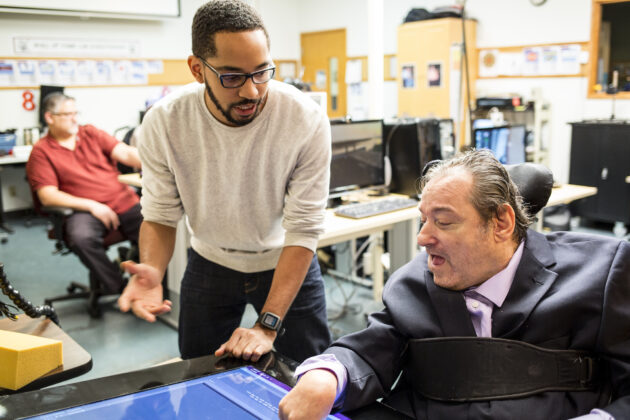UW Go Baby Go, co-directed by CREATE Associate Director Heather Feldner, is excited to announce its fall workshop where we will build ten Go Baby Go cars for local children with disabilities and their families! UW and CREATE students, postdocs, and faculty (especially from engineering, computer science, and rehab programs), local clinicians, and parents/caregivers are all encouraged to attend. Saturday, November 6, 2021 * Workshop: 8:30 a.m.-2 p.m. * Family car fittings and pickup: 2-4 p.m. UW Rehab Medicine, BB tower…
Category: Faculty Profiles
Faculty members of UW CREATE.
$1M NIDILRR award for leadership training program
A team of CREATE faculty has received a five-year, $1M grant from the National Institute on Disability, Independent Living, and Rehabilitation Research (NIDILRR) for the project, “ARRT: Postdoctoral Training in Physical Computing and Fabrication to Support Innovations for Community Living and Participation.” Congratulations on the funding to the team members: Co-PI Jennifer Mankoff, Ph.D and Professor Paul G. Allen School of Computer Science and Engineering Co-PI Anat Caspi, Ph.D. and Principal, Paul G. Allen School of Computer Science & Engineering…
Jon Froehlich named Outstanding Faculty Member by the UW College of Engineering
Congrats to CREATE Associate Director Jon Froehlich on being selected for the Outstanding Faculty Award by the UW College of Engineering! As noted by the College, Froehlich went to extraordinary measures to support his students’ learning during the pandemic. He fundamentally transformed physical computing courses for virtual platforms, assembled and mailed hardware kits to students’ homes, and developed interactive hardware diagrams, tutorials and videos. In addition, Froehlich co-created and led a group of university educators to share best practices for…
Accessible CS Education workshop focuses on inclusive experiences
Amid a global pandemic, innovative thinkers have been hard at work developing plans to improve equity in modern learning environments. The Accessible Computer Science Education Fall Workshop was held November 17-19, 2020, and jointly sponsored by Microsoft, The Coleman Institute for Cognitive Disabilities, and CREATE. Each day of the event focused on strategies to improve classroom experiences for students and faculty with disabilities. You can watch recorded sessions where speakers provided a wide range of perspectives on computer science pedagogy…
Mankoff wins AccessComputing Capacity Building award
December 16, 2020 Through her leadership, the SIGCHI Executive Committee now has adjunct chairs for accessibility, which institutionalizes accessibility as an important facet of SIGCHI activities. Jen holds monthly online meetings of the AccessSIGCHI leadership team to help set and execute its agenda. Every year AccessComputing honors someone with the AccessComputing Capacity Building Award for their work and accomplishments that have changed the way the world views people with disabilities and their potential to succeed in challenging computing careers and activities. Excerpted from an…
CREATE faculty and students awarded at ASSETS 2020
Congratulations to UW CREATE faculty on multiple awards at ASSETS 2020, the International ACM SIGACCESS Conference on Computers and Accessibility! “The University of Washington has been a leader in accessible technology research, design, engineering, and evaluation for years. This latest round of awards from ACM ASSETS is further testament to the great work being done at the UW. Now, with the recent launch of CREATE, our award-winning faculty and students are brought together like never before, and we are already…
SoundWatch smartwatch app alerts d/Deaf and hard-of-hearing users to sounds

October 28, 2020 | UW News UW CREATE faculty members Jon Froehlich and Leah Findlater have helped develop a smartwatch app for d/Deaf and hard-of-hearing people who want to be aware of nearby sounds. The smartwatch will identify sounds the user is interested in — such as a siren, a water faucet left on, or a bird chirping — and send the user a friendly buzz along with information. “This technology provides people with a way to experience sounds that…
Feldner team receives grant to study pediatric mobility technology
October 20, 2020 The team, one of only three selected across the country, includes Sam Logan, an associate professor at Oregon State University, and Lisa Kenyon, a professor at Grand Valley State University. Study Details: The use of powered mobility devices for young children with cerebral palsy (CP) has been gaining traction. Evidence shows that the use of powered mobility at young ages complements (rather than detracts from) other interventions focused on more traditionally viewed mobility skills such as crawling…
NIH Rehabilitation Research 2020
October 13, 2020 Dr. Kat M. Steele, an associate director of CREATE, presents at NIH’s Rehabilitation Research 2020: Envisioning a Functional Future conference on Friday, October 16, 2020. She will be presenting in the Mobility Across the Lifespan session with Bernadette Gillick, PhD, PT from the University of Minnesota and Levi Hargrove from the Shirley Ryan AbilityLab. This meeting highlights rehabilitation research and informs the congressionally-mandated NIH Research Plan on Rehabilitation Research to inform priorities for the next four years….
UW CREATE leadership at ASSETS 2020
UW CREATE has a large and quality presence at ASSETS 2020, the premier annual conference for accessible computing research. Drawing from three departments, University of Washington authors contributed to six papers and two posters to be presented at this year’s online conference. Three of our papers were nominated for best paper! Seven members also served in conference roles: two on the organizing committee and five on the program committee. The papers and posters span a variety of topics including input…
Richard Ladner Receives 2020 Public Service Award from National Science Board
National Science Board | August 11, 2020 Dr. Richard Ladner, CREATE’s Director for Education, has been named the 2020 recipient of the Public Service Award for an individual from the National Science Board (NSB). In recognizing Ladner, the board cited his exemplary science communication, diversity advocacy, and well-earned reputation as the “conscience of computing.” “When we think about diversity, we must include disability as part of that. The conversation about diversity should always include disability.” Richard Ladner, Professor Emeritus, University of Washington’s Paul G. Allen School of Computer Science & Engineering From…
AccessComputing shares UW CREATE’s launch and work toward accessibility
CREATE faculty are already internationally recognized for their contributions to assistive technology and accessible computing; by bringing them together under one organizational roof, CREATE will enable synergies and foster collaborations that enable faculty and students to become more than the sum of their parts.
Can Project Sidewalk Use Crowdsourcing to Help Seattleites Get Around?
July 23, 2019 | SeattleMet With the goal of making navigating our streets safer and easier for the mobility impaired, Jon Froehlich’s Project Sidewalk turns mapping sidewalks and improving pedestrian accessibility into a virtual game. To complete missions, users “walk” through city streets via Google Street View, labeling and rating the quality of sidewalks and features that make it easier—or tougher—to get around. They identify curb ramps, or lack thereof, assess their positioning, and point out tripping hazards. Since Froehlich…
Q&A with Jacob Wobbrock on UW’S new accessible technology research center

iSchool news, University of Washington | May 28, 2020 Jacob O. Wobbrock, CREATE Co-Director and a professor in the UW Information School, has become one of the world’s foremost experts on accessible computing and human-computer interaction. His approach is to create interactive systems that can capitalize on the situated abilities of users, whatever they are, rather than make users contort themselves to become amenable to the ability-assumptions of rigid technologies. He calls this perspective Ability-Based Design. In the iSchool article, Wobbrock…
New UW center bankrolled by Microsoft aims to make technology more accessible to disabled people
The Seattle Times | May 28, 2020 University of Washington professor Jacob Wobbrock figures the best way to make technology more accessible to disabled people is to anticipate their needs from the very beginning. “The world we live in is built on certain assumptions,’’ Wobbrock said. “If we question those assumptions right from the start when we design things, then suddenly things are accessible.’’ The Center for Research and Education on Accessible Technology and Experience (CREATE) is launching with a nine-member,…
Microsoft invests $2.5M in CREATE, a new center for accessible tech at the University of Washington

GeekWire | May 28, 2020 Microsoft and the UW have long been aligned in a shared commitment to accessible technology and a world that is more accessible through technology. With a leadership team from six campus departments in three different colleges, CREATE will build upon the UW’s existing work in education, research and translation. Read the full GeekWire article.
UW Disability Studies, D Center win UW Medicine CLIME Grant
UW faculty and staff affiliated with CREATE, UW Disability Studies and the UW D Center have received a grant from the Center for Leadership and Innovation in Medical Education (CLIME) to explore what it means to be an ally to people with disabilities. “This is an integral issue informing professional education in the medical fields as well as in design and engineering, says PI Heather Feldner. “I am most excited that this project has the potential to further the conversation about how an…
Kat Steele honored by students with FACET award

April 2020 Kat Steele, CREATE Associate Director and the Albert S. Kobayashi Endowed Professor of Mechanical Engineering, received a 2020 Faculty Appreciation for Career Education & Training (FACET) award from appreciative students. Presented by the Career Center @ Engineering, the award recognizes faculty members who have positively impacted their career and professional development.
Four CREATE faculty receive Google Research Awards
UW News | March 16, 2020 Four UW CREATE faculty have been named recipients of Google Faculty Research Awards. The grants, among 150 Google recently announced, support world-class technical research in computer science, engineering and related fields. Each award provides funding to support one graduate student for a year. The recipients are Jennifer Mankoff, James Fogarty and Jon Froelich of the Paul G. Allen School of Computer Science & Engineering and Leah Findlater of the Department of Human Centered Design & Engineering. The goal of the awards is “to identify and strengthen…
ASSETS Paper Impact Award
Jacob Wobbrock honored for improving touch-screen accessibility Congratulations to Jacob O. Wobbrock, a founding co-director of CREATE, for his work with Shaun Kane, PhD ’11 and Jeffrey Bigham, PhD ’09 improving the accessibility of mobile technology. The team received the 2019 SIGACCESS ASSETS Paper Impact Award for their 2008 paper, “Slide Rule: Making mobile touch screens accessible to blind people using multi-touch techniques.” The award is given biennially by the Association for Computing Machinery’s Special Interest Group on Accessible Computing and recognizes…